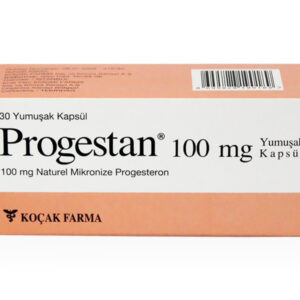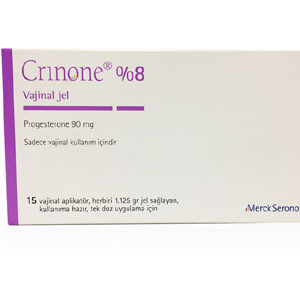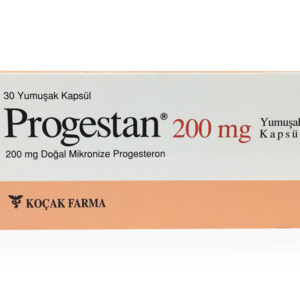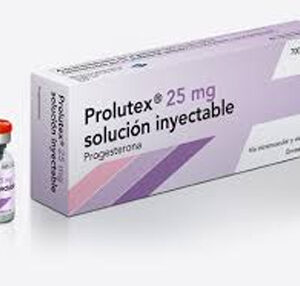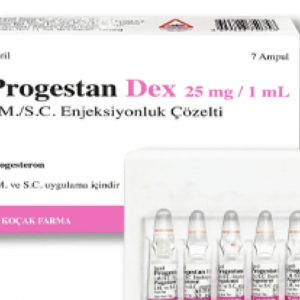Description
Important Information About Progesterone
Progesterone 50 MG is a female sex hormone, also known as a progestogen. It plays a crucial role in fertility. Here are some key points to remember:
- Progesterone is used in various treatments such as IVF, managing heavy bleeding during menstruation, treating the absence of menstruation, and alleviating menopause symptoms.
- It is sometimes used to prevent premature birth.
- In most applications, this medicine is used in the second half of the menstrual cycle. In IVF treatment, it is typically used from the time the eggs are removed.
- For oral capsules: swallow them whole with half a glass of water.
- For vaginal tablets, capsules, gel, and ovules: insert them deeply into the vagina. The tablets and gel should be inserted using the provided applicator. The vaginal capsule and ovule should be pushed deep into the vagina with your fingers.
- Your period may become irregular at first. If this continues to bother you, consult your doctor.
- For injections: the doctor will inject progesterone under the skin or into a muscle. You can also learn to inject yourself.
- You may experience vaginal bleeding and cramps with the injection, as well as pain, irritation, itching, and swelling at the injection site.
- If you stop using progesterone, your period may be irregular for the first time, especially if you have used progesterone for several months.
- If you are pregnant or planning to become pregnant, talk to your doctor or pharmacist about whether you can use progesterone safely.
You may use this medicine while breastfeeding.
What is Progestan 50 MG and for what is it used?
Progeston is a female sex hormone, specifically a progestogen hormone. It plays a crucial role in the menstrual cycle and fertility.
Doctors prescribe progesterone for various conditions such as reduced fertility, abnormal vaginal bleeding, menstrual cycle disorders, menopausal symptoms, and to prevent preterm birth. It is also sometimes prescribed for cases of threatened preterm birth.
Reduced Fertility
Unwanted childlessness can be due, in part, to insufficient hormone production. Progestogen hormones, along with estrogen hormones, play a crucial role in fertility. The balance between these hormones is vital. An imbalance can lead to failed ovulation or a less hospitable environment in the uterus for a fertilized egg to implant.
Progesterone is the hormone that prepares the uterus for the implantation of a fertilized egg.
This medication is used in IVF treatments. In IVF (in vitro fertilization) treatment, fertilization occurs outside the body. Mature eggs are extracted from the body for subsequent fertilization. A fertilized egg is then placed in the uterus.
The uterus must be adequately prepared to receive the fertilized egg. Doctors often prescribe progesterone capsules that are administered vaginally. In some cases, the doctor may prescribe a progesterone injection.
Effect Progesterone modifies the endometrium so that an egg can properly implant itself.
Abnormal Vaginal Blood Loss
If menstruation is irregular, significantly more intense, or occurs at different times than usual, it is considered abnormal blood loss.
Cause:
Progestogen hormones, in conjunction with estrogen hormones, play a crucial role in the menstrual cycle. The balance between these hormones is vital. If there’s an imbalance, the cycle can become irregular. This is the case during menopause, for instance, when the production of estrogen hormone gradually decreases.
Abnormal blood loss can also be caused by fibroids in the uterus, or by other uterine conditions such as infections. However, sometimes no cause can be found. Excessive blood loss may eventually lead to anemia, which often results in fatigue.
Treatment:
There are several treatments available. If you do not wish to have children, you can use an IUD with levonorgestrel or a birth control pill. These options reduce blood loss. If you prefer not to use hormones, the doctor may prescribe an NSAID-type painkiller, such as ibuprofen. This also reduces the amount of blood during menstruation. If necessary, the doctor may also prescribe tranexamic acid.
For extremely heavy bleeding, for example, due to fibroids, the doctor may prescribe a progestogen hormone, such as progesterone.
Effect:
Progesterone can regularize an irregular cycle and reduce heavy bleeding. The bleeding becomes less intense, shorter, and less painful than a regular period. Usually, the doctor prescribes it for 12 to 14 days every 4 weeks. If you stop after 12 days, bleeding occurs. This is not actual menstruation, but a withdrawal bleeding.
The effect on irregular or heavy bleeding may take a bit longer. You usually must use this medication for several months before you can determine if it is working effectively.
Disorders During the Menstrual Cycle
Progestogen and estrogen hormones play a pivotal role in the menstrual cycle. The balance between these hormones is crucial. If this balance is disrupted, it can lead to delayed menstruation. This disruption can occur due to extreme weight loss or gain, Polycystic Ovarian Syndrome (PCOS), menopause, stress, benign growths in the pituitary gland (a part of the brain), or certain chronic diseases. However, there are instances where no direct cause can be identified.
Treatment
If no direct cause can be identified and pregnancy is not a factor, the doctor may recommend progesterone. This medication should be taken for 12 to 14 days each month. Upon discontinuing progesterone, withdrawal bleeding usually occurs within 7 days. It may take some time for the cycle to normalize on its own after this treatment.
Please note that this information is a general guideline and may not apply to everyone.
Menopause
Symptoms
An estrogen deficiency can cause menopausal symptoms such as menstrual irregularities, hot flashes, sweating attacks, sleep problems, irritability, and mood swings. The mucous membrane of the vagina may become drier, making intercourse painful and increasing the likelihood of vaginal infections.
Cause
As ovarian activity gradually declines between the ages of 40 and 55, an estrogen deficiency develops in the body. Menstruation gradually ceases. The last menstruation is called menopause. After menopause, the body produces fewer estrogens than during the fertile phase of life. This estrogen deficiency causes menopausal symptoms. Menopausal symptoms also occur if the ovaries are surgically removed.
Treatment
Doctors prescribe medication only if the menopausal symptoms significantly interfere with your normal daily activities. Estrogen hormones, combined with progestin hormones, such as progesterone, can alleviate menopausal symptoms.
The progestogen hormone is necessary for women who still have their uterus. It prevents the endometrium from growing excessively due to estrogen hormones. This could potentially prevent the development of uterine cancer.
You can use progesterone for 12 to 14 days per cycle. After that, you will have a stop week. During this stop week, you will experience menstrual-like withdrawal bleeding.
Premature Birth
A typical pregnancy lasts about 40 weeks, counting from the first day of the last menstrual period12. If contractions occur too early during pregnancy, the child’s life may be at risk. In such cases, the doctor may prescribe progesterone to prevent preterm labor. Progesterone is used in cases of threatened preterm labor only if labor-inhibiting drugs do not work sufficiently.
The doctor may also prescribe progesterone during pregnancy if you have previously given birth prematurely.
What are the possible side effects?
In addition to the desired effect, this drug may cause side effects.
The main side effects are as follows:
Sometimes (in 10 to 30 in 100 people)
- Irregular bleeding (“spotting”)
- Absence of menstruation
- When injected under the skin or into the muscle: vaginal cramps and vaginal bleeding.
- Pain, irritation, itching, and swelling at the injection site.
Rare (in 1 to 10 in 100 people)
- Gastrointestinal symptoms, such as abdominal pain, nausea, constipation, diarrhea, a bloated abdomen, and very rarely flatulence.
- If you use this medicine vaginally: itching, burning in the vagina, and fluid or mucus coming out of the vagina.
- If you use this medicine vaginally: irregular bleeding (“spotting”).
- If you use this medicine vaginally: absence of menstruation.
- If injected under the skin or into the muscle: bruising and hardening at the injection site.
Very rarely (in less than 1 in 100 people)
- If injected under the skin or into the muscle: drowsiness, fatigue, mood swings, and dizziness.
- May trigger an attack of acute porphyria. Acute porphyria is a metabolic disorder in which you have attacks of abdominal pain, vomiting, fever, and palpitations.
Contact your pharmacist or doctor if you experience these or other side effects that worry you too much.
How do I use this medicine?
How to use:
- Capsules: Swallow whole with half a glass of water.
- Vaginal tablets: Use the applicator provided to insert the tablet into the vagina. Place the tablet in the cavity of the applicator. Gently insert the applicator 8 to 10 cm deep into the vagina. This can be done while standing, sitting, or lying on your back. If you are lying on your back, keep your legs slightly bent and spread. Then, empty the applicator. Remove the applicator and clean it well with warm running water.
- Vaginal capsules: First, wash your hands. Then, use one or two fingers to push the capsule deep into your vagina.
- Vaginal gel: Use the applicator provided to insert the gel into the vagina. Take the applicator out of the package. Press firmly into the end of the applicator so that all the gel moves to the thin end. Open the applicator and gently insert it 8 to 10 cm deep into the vagina. This can be done while lying on your back. Keep your legs slightly bent and spread. Then, empty the applicator. Remove and discard the applicator. Each applicator should only be used once.
- Ovule (vaginal suppository): First, wash your hands. Then, push the ovule deep into your vagina with your fingers. This can be done while standing, squatting, or lying on your back. If you are lying on your back, keep your legs slightly bent and spread.
- Injection (under the skin or into the muscle): The injection into the muscle is administered by a doctor or nurse. The injection under the skin can be administered by yourself or by a doctor or nurse. The best place for the injection under the skin is the top of your thighs or your abdomen. Use the injection only when the fluid is clear.
When to use:
On which days?
In most applications, you use this medicine in the second half of the menstrual cycle, such as from day 11 (the first day of menstruation is called “day 1”). In IVF treatment, you should usually use this medicine from the time the eggs are harvested.
When during the day?
In most applications, take it in the evening before going to bed. Sometimes the doctor prescribes an additional dose in the morning. For IVF treatment, it’s usually 1 to 3 times a day, dividing the times as much as possible throughout the day. If you are taking this medicine once a day, it is common to take the dose in the morning.
How long to use:
- Depending on the reason you are taking it, you may use progesterone for several weeks to several months.
- In IVF treatment, you usually use this medicine for up to and including 30 days after you are shown to be pregnant. When injecting, you use this medicine for up to 12 weeks after you are shown to be pregnant.
- With cyclic use, you will take this medicine during a specific period of the menstrual cycle.
- Early pregnancy: consult with your doctor.
- After stopping progesterone, a menstrual-like withdrawal bleeding occurs after 3 to 7 days.
What should I do if I have forgotten a dose?
You must take this medication consistently on the prescribed days.
Capsules
- If you are taking 1 capsule in the morning and 2 capsules in the evening, and you have forgotten a dose, skipped the forgotten dose and take the rest of the doses as usual.
- If you are taking 2 capsules in the evening and notice in the morning that you forgot them, then take 1 capsule the next morning and 2 capsules in the evening as usual.
Vaginal application and injection
If you have forgotten a dose, insert the medicine as soon as possible. This is because there must always be enough progesterone in your blood.
Under what names is progesterone available?
The active ingredient, progesterone, is found in the following products:
- Utrogestan
- Lutinus
- Crinone
- Cyclogest
- Prolutex
Can I use progesterone with other medications?
There are no known significant interactions between this drug and other medications.
Can I stop taking this medicine abruptly?
You should not stop taking this medicine without consulting your doctor. After discontinuing, you may experience a withdrawal bleed within a few days.
It’s possible that menstruation does not return immediately after discontinuing use, especially if the medicine has been used for several months. Consult your doctor if you are concerned about the absence of menstruation.

